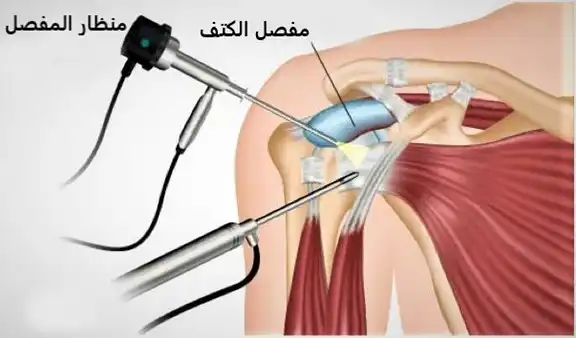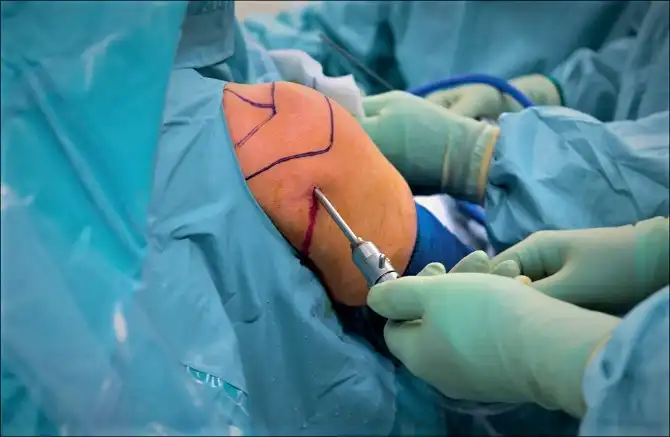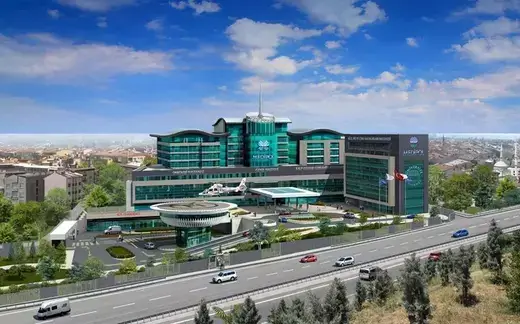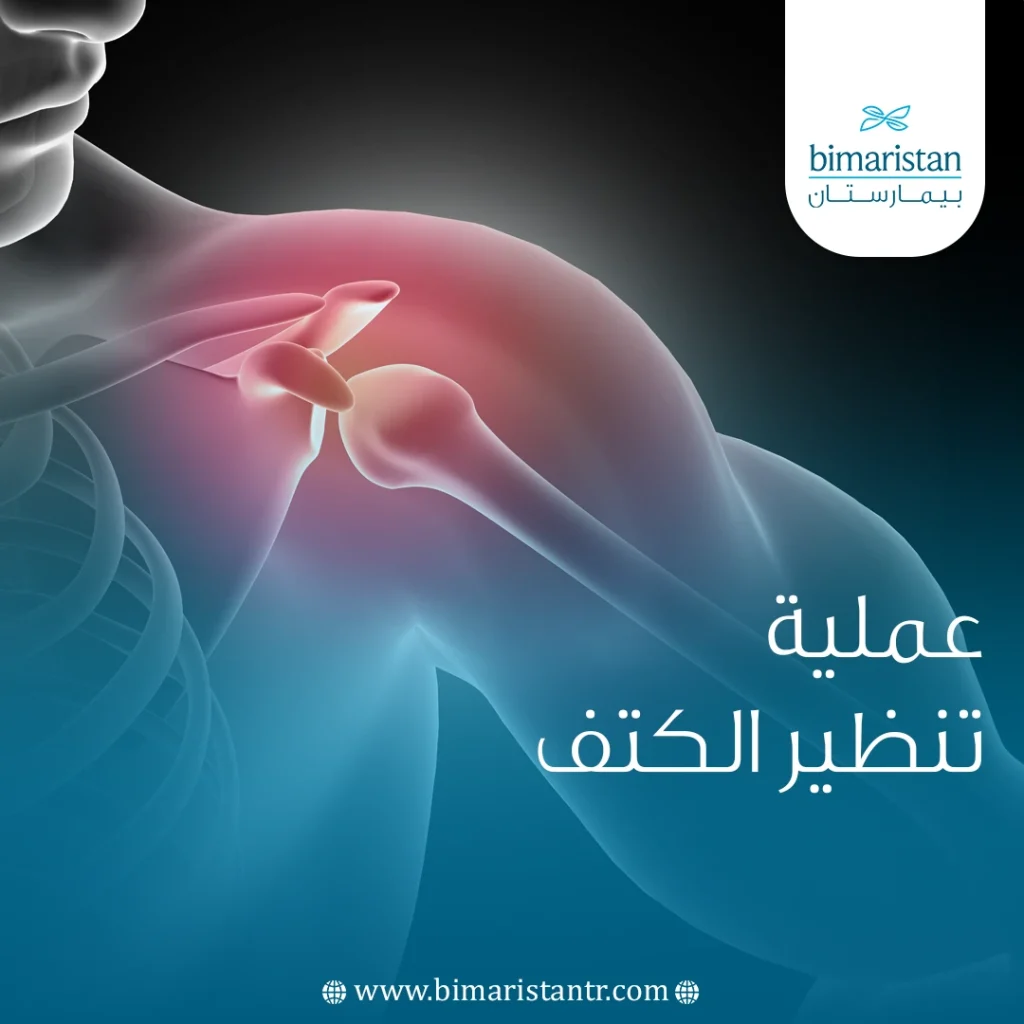عمليه منظار الكتف هو إجراء جراحي يستخدم لإصلاح الأنسجة في مفصل الكتف أو حوله، ويدخل تحت تصنيف جراحة المفاصل بالمنظار، وقد شهدت هذه الطريقة تطوراً كبيراً في تركيا.
ما هي عمليه منظار الكتف؟
تعتبرعمليه منظار الكتف تقنية قليلة التوغل توفر لجراحي العظام القدرة على الوصول إلى مفصل الكتف والعمل على علاجه من خلال جروح صغيرة جداً فقط.
عمليه منظار الكتف shoulder arthroscopy هو ثاني أكثر عمليات تقويم العظام شيوعاً بعد تنظير مفصل الركبة.
يستخدم تنظير مفصل الكتف بشكل شائع لعلاج و إصلاح أمراض الكتف بما في ذلك تمزق الكفة المدورة (rotator cuff tears)، وتمزق شفا الكتف (labral tears)، والتهاب المفاصل التنكسي (degenerative arthritis)، والتهاب المحفظة اللاصق (adhesive capsulitis).
يتميز التنظير بالكثير من المميزات مقارنة بإجراء العملية المفتوحة، بما في ذلك الرؤية الأفضل التي يمنحها للجراح، بالاضافة الى ميزة الجروح الصغيرة مع انخفاض معدلات الإصابة بالعدوى، وإمكانية الشفاء والعودة الى الحياة الطبيعية بشكل أسرع.

ما هي جراحة المفاصل بالمنظار؟
تنظير المفاصل (أرثروسكوبي) هو مصطلح مشتق من الكلمات اليونانية (arthro) والتي تعني مفصل و (skopein) والتي تعني النظر، وجراحة تنظير المفصل عملية حديثة طفيفة التوغل يستخدمها الجراحين للنظر داخل المفصل لتشخيص المشاكل المفصلية وعلاجها.
تنظير مفصل الكتف هو إجراء يتم خلاله إدخال المنظار (وهو أداة تحتوي على عدسة كاميرا ونظام إضاءة بالألياف الضوئية) عن طريق ثقوب صغيرة لا تتجاوز 0.5 سم في جلد المريض، يتم بعد ذلك توصيل منظار الخاص بشاشة تلفزيون تعرض البنى داخل المفصل في غرفة العمليات.
ما هي بدائل عمليه منظار الكتف (المفاصل) في التشخيص والعلاج؟
يسمح التنظير باستخدام المنظر المكبر للجراح برؤية واستكشاف البنى الداخلية للمفصل لتشخيص شدة الإصابة أو نوعها.
في البداية، كان منظار المفاصل يستخدم فقط كأداة تشخيصية، ولكن الآن يمكننا معالجة الإصابات التي قد تسبب آلام مفاصل أو مشاكل في الحركة بالتنظير المفصلي.
يمكن استخدام التصوير المقطعي المحوسب CT أو الرنين المغناطيسي في تشخيص بعض أمراض المفاصل إلا أنها قد لا تظهر الأذيات الباكرة في المفاصل أو أن الإصابة قد لا تظهر أبدا بسبب توضعها.
هل جراحة تنظير المفصل خيار مناسب لك؟
إذا كنت تعاني من آلام أو يبوسة في مفصل الركبة أو الكتف قد تكون جراحة تنظير المفصل أو كما تسمى الجراحة بالمنظار خياراً لك.
وأصبحت جراحة تنظير المفاصل معروفة للجمهور لأول مرة من خلال استخدامها في علاج الإصابات الرياضية التي يتعرض لها الرياضيون، وعلى سبيل المثال تمزق غضروف الركبة لدى لاعبي كرة السلة، تمزق ركبة العداء أو تمزق الرباط الصليبي أثناء سباقات الماراثون، أو التهاب أوتار الكتف عند لاعبي التنس أو رماة البيسبول.
الآن، يقدَّر أن نسبة 80٪ من الأطباء يستخدمون تنظير المفاصل لإجراء علاج جراحي، حيث يعد تنظير المفاصل مفيداً لأنه عموماً يكون أسهل على المريض من الجراحة المفتوحة ويتطلب وقتاً أقصر للشفاء.
ومن الأعراض التي غالبا ما يأتي بها المرضى لمركز بيمارستان، ويكون فيها إجراء تنظير الكتف مفيدا في تشخيص الحالة أو علاجها:
- آلام الركبة
- آلام الكتف
- آلام الكاحل والورك
- يبوسة بالمفاصل
- تورم
- صعوبة حركة
- الضعف الاستقرار (الخلع)
- حالات طبية لا تستجيب لعلاجات محافظة (كالراحة والثلج والضغط والرفع)، ولا تتحسن على العلاج الطبيعي

لمعرفة اذا كانت عملية تنظير الكتف مناسبة لديك، لا تتردد بالتواصل معنا، مركز بيمارستان عائلتك في تركيا.
ماهي فوائد عمليه منظار المفصل؟
مقارنة بالجراحة المفتوحة (التي تتطلب شق كبير للوصول إلى المنطقة المعنية)، تقدم جراحة المنظار فوائد عدة:
- ألم أقل: فالجرح صغير والأدوات الجراحية أصغر فيصبح الألم أقل .
- التكلفة المخفضة: حيث يمكن إجراء تنظير الركبه أو الكتف في أغلب الأحيان على جهاز في العيادة الخارجية، دون الحاجة إلى المبيت في المستشفى.
- التعافي بشكل أسرع: رض أقل وفترة تعافي أسرع من العملية المفتوحة.
- رؤية أفضل: جراحة تنظير المفصل تقدم للجراح صورة مكبرة ورؤية محسنة للجزء الداخلي من المفصل.
- تجرى تحت تخدير موضعي.
- ندبات صغيرة وغير ظاهرة.
ما هي أمراض الكتف التي يمكن علاجها بالمنظار؟
يستخدم تنظير الكتف shoulder arthroscopy لفحص الكتف من الداخل ولتحديد سبب الآلام والتشخيص إضافة لذلك يمكُّننا هذا الإجراء من علاج العديد من أمراض الكتف وإصاباته، بما في ذلك:
- تمزق الكفة المدورة
- متلازمة اصطدام الكتف
- الكتف المتجمد
- هشاشة عظام الكتف
- تمزقات وتر العضلة ذات الرأسين عند الكتف
- عدم استقرار الكتف
- خلع الكتف المتكرر
- كسور الكتف
- خلع بالمفصل الأخرمي الترقوي
- ضغط العصب فوق الكتف
- التهاب أوتار تكلسي
ملاحظة: يمكن أيضا استخدام تنظير الكتف مع الجراحة المفتوحة في بعض الإجراءات، وذلك اعتمادا على تقييم وتشخيص طبيب مختص، قد يجمع الدكتور حواف الوتر الممزق معا، ثم يقوم بتوصيل الوتر بالعظم بالخيوط أو المسامير المعدنية أو البلاستيكية، قد يقوم الطبيب أيضا بتنظيف الأنسجة التالفة أو الملتهبة أو إزالتها. لذا تستغرق إجراءات الكتف حوالي ساعة واحدة في العيادات الجراحية الخارجية وتجرى تحت تخدير عام أو موضعي وذلك مايحدده الطبيب.
بعض الحالات لا تعالج بتنظير الكتف وتتطلب إجراء استبدال مفصل الكتف.
للمزيد عن جراحات المفاصل والجراحات المتقدمة في تركيا يمكنك أن تقرأ على موقعنا أيضاً عن استبدال مفصل الركبة بواسطة الروبوت.
مضاعفات عملية تنظير الكتف
على الرغم من نسبة الأمان المرتفعة في هذه العملية وخاصة في تركيا، إلا أن هذه العملية تحمل في طياتها العديد من المخاطر غالبا تكون بسبب الوضع التشريحي لمفصل الكتف أو وضعية المريض أثناء العملية.
ومن هذه المضاعفات:
- نزيف في مكان المفصل أو في المناطق المجاورة.
- التهاب أو إنتان مكان الجراحة (الجرح) بسبب فلة التعقيم.
- أذية في مفصل الكتف أو في غضروفه.
- تيبس في المفصل وعدم شفاء المفصل بشكل كامل.
- رد فعل تحسسي تجاه المعدات أو المواد أو الدواء.
- انتقال العدوى للصدر أو الدماغ حسب وضعية المريض.
ماذا بعد تنظير مفصل الكتف؟
تختلف فترة الشفاء من شخص لآخر، لكن معظم المرضى يعودون إلى المنزل في نفس اليوم ويستغرقون بضعة أسابيع إلى بضعة أشهر حتى يشفوا بعد الإجراء الجراحي.
ينصح الطبيب المرضى الذين أجري لديهم تنظير مفصل الكتف بـ:
- الراحة التامة للمفصل والابتعاد عن تحريكه أو حمل الأوزان عليه ريثما يتم الشفاء.
- وضع الثلج على المفصل المصاب.
- تناول المسكنات في حال وجود ألم شديد لا يطيقه المريض.
- ارتداء حمالة خلال فترة شفاء مفصل الكتف.
بالإضافة إلى أن أخصائي العظام قد يوصي بالعلاج الطبيعي للمساعدة في تقوية مفصل الكتف والعضلات المحيطة به واستعادة نطاق الحركة للحصول على نتيجة جيدة.
وقد يحتاج الرياضيين للتأهيل الرياضي تحت إشراف طبيب مختص للمحافظة على لياقتهم والعودة بأسرع ما يمكن لممارسة الرياضة.
وبعد 15 يوم من تنظير الكتف، تزال الغرز عندها يمكن للمريض الاستحمام لكن يجب عليه ألا يجهد كتفه لأن الكتف هنا لم يُشفَ بشكل كامل.
وبمساعدة الطبيب الفيزيائي الذي يرشد المريض للقيام بتمارين لتقوية المفصل ومنع عضلاته من الضمور، تعود الوظيفة الطبيعية للمفصل خلال ثلاثة أشهر تقريبا وذلك اعتمادا على نوع الإصابة المفصلية ومدى نجاح العملية وتجاوب المريض مع المعالج الفيزيائي.
المصادر:








